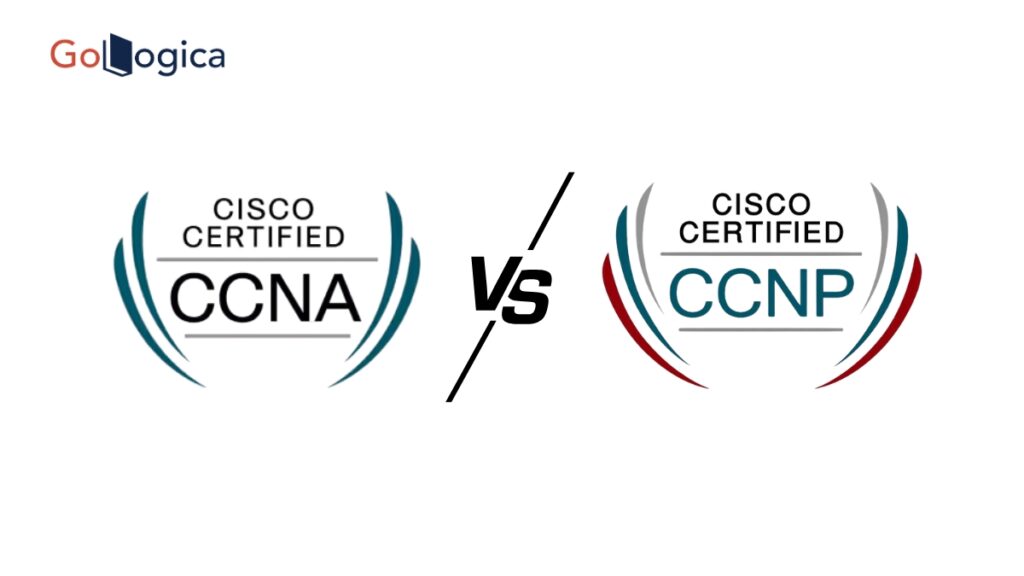
Table of content
Introduction of Cisco Certification
CCNA (Cisco Certified Network Associate):
- Level:
- Focus:
- Skills:
- Job Roles:
- Exam:
- Career Path:
CCNP (Cisco Certified Network Professional):
- Level: Professional-level, advanced.
- Focus:
- Skills:
- Job Roles:
- Exam:
- Career Path:
Key Differences:
Level of Knowledge:
Scope of Knowledge:
Career Paths:
Exam Requirements:
Salary Potential:
Conclusion
Introduction
A Cisco certification is an internationally acknowledged qualification, confirming the holder to be an expert in networking technologies, particular those produced and serviced by Cisco Systems. Cisco certification program is designed in such a way that it meets the current demands of the IT industry as well as it provides a comprehensive career ladder to the professionals in the field of all levels, including entry-level technicians and expert-level architects. These exams are very well known in the networking industry and are usually a major prerequisite to positions dealing with design, implementation, management, and troubleshooting of network solutions.
Cisco certification tree is categorized into various levels which are, Entry (like CCST), Associate (like CCNA), Professional (like CCNP), and Expert (like CCIE). Every level is targeted at the other set of abilities and responsibilities. As an example, the Cisco Certified Network Associate (CCNA) certification targets individuals who want to receive introductory knowledge of networking, such as IP addressing, routing and switching protocols, security, and automation. It is usually the first major landmark to the aspiring network professionals.
The Cisco Certified Network Professional (CCNP) on the other hand, is an intermediate level certification targeted at professionals wishing to advance their knowledge of planning, implementing and troubleshooting complex enterprise networks. The CCNP qualified individuals are also ready to deploy and manage the wide and local area networks, work with the professionals to develop the innovative solutions, and ensure the performance and security of the networks at the large scale. To receive CCNP, the candidates are normally expected to have an active CCNA certification, and also pass several concentrated exams, which assist in showing their expertise ability in Cisco networking technologies.
Summary
The Cisco certifications offer a structured and respected way of validating the skills and knowledge of networking, career progression, and keeping in line with the recent trend in the market. As a means of launching a career or as a means of securing an avenue into the more advanced jobs, the certification program provided through Cisco provides the means by which one needs to get ahead and the respect by which one needs to advance his or her career in the constantly evolving field of information technology.

CCNA (Cisco Certified Network Associate):
Cisco Certified Network Associate (CCNA) is a world-renowned, low-level credential program aimed to help professionals to begin a new career in networking and information technology infrastructure. As an associate level certification, CCNA ensures the understanding and practical ability of installing, configuring, operating, and troubleshooting Cisco networks. The networking concepts deemed as substantial and part of certification are network fundamentals, network access, IP connectivity, IP services, security fundamentals, automation, and programmability.
CCNA is suitable to those who are intending to become network specialists, administrators and support engineers, and is usually a prerequisite to other advanced Cisco certifications such as CCNP. The certification process involves passing a single comprehensive exam (200-301), with no formal prerequisites, though prior networking experience or training is recommended. CCNA certified individuals are prepared to become a network administrator, systems engineer, or IT support specialist, and are considered highly marketable to employers due to the skills to manage and secure current network infrastructures. The certification lasts three years before it needs to be renewed by either retesting or obtaining a higher certification.
Level
CCNA is an Associate-level certification in the Cisco hierarchy.
It sits between Entry (CCST) and Professional (CCNP) levels.
The certification aims at networking novices and those in the early-career professionals.
It validates foundational knowledge in Cisco networking technologies.
CCNA certification is one of the most important steps on the way to the career in IT and networking.
Focus
CCNA focuses on core networking concepts and practical skills.
It covers network installation, configuration, operation, and troubleshooting.
The curriculum emphasizes routing, switching, security, and automation.
It prepares candidates for real-world networking environments.
CCNA is extensive covering both the old and the new networking requirements.
Skills
CCNA holders demonstrate proficiency in IP addressing and submitting.
They can configure and manage Cisco routers and switches.
Skills include understanding network security basics and automation principles.
Troubleshooting network issues is a core competency.
Candidates also learn about wireless, cloud, and virtualization fundamentals.
Job Roles
Common roles include Network Administrator and Network Support Engineer.
CCNA can be applied to the post of Network Analyst and Network Technician.
It paves the way to careers such as System Engineer and Help Desk Technician.
Employers value CCNA for entry-level and mid-level networking jobs.
The certification opens intermediate IT and security positions.
Exam
The main exam is CCNA 200-301 (as of recent updates).
It consists of about 120 multiple-choice questions.
Candidates have 120 minutes to complete the exam.
The passing score is typically around 82.5% (825 out of 1000).
The certification exams are given online or in test centers and are valid in three years.
Career Path
CCNA forms the base of high level Cisco certifications such as CCNP and CCIE.
It opens energetic pay scale positions in networking and IT infrastructure.
The certified professionals have the option of specializing in security, wireless or data center.
CCNA supports career transitions into DevOps, cloud, and cybersecurity.
It is known worldwide and improves the ability to be employed in technological fields.
CCNP (Cisco Certified Network Professional):
Cisco Certified Network Professional (CCNP) is a professional-level certification that is regarded worldwide and that is developed to help network specialists with experience to upgrade their skills in the field of enterprise networking. CCNP is positioned in the certification hierarchy of Cisco above the Associate (CCNA) and below the Expert (CCIE) levels, therefore it is a bridge certificate of mid-to-senior IT professionals.
CCNP certification confirms the advanced knowledge of planning, implementing, verifying, and troubleshooting of complicated enterprise networks, which incorporate both local and wide area networks (LAN/WAN). It covers a significant scope of technologies, routing and switching, security, automation, wireless, and collaboration with a massive emphasis on real-life situations and work along with experts. Earning CCNP requires passing one core exam and one concentration exam in the technology track of the candidate, demonstrating the balance between broad competence and deep concentration that Cisco has always had.
The certification would best suit network engineers, administrators and support professionals who wish to take up higher positions and have increased responsibility in designing and optimization of enterprise network infrastructures.
GoLogica offers comprehensive Cisco UCS Administration Training designed to equip professionals with the skills to manage and optimize Cisco Unified Computing Systems.
Level: Professional-level, advanced
CCNP is a Cisco professional level certification, and is aimed at network professionals.
It falls above an Associate-level CCNA but below an Expert-level CCIE.
CCNP confirms intermediate enterprise networking expertise and knowledge.
It is commonly considered as a standard of mid-to-senior IT networking professions.
Focus
CCNP is concerned with planning, implementing, verifying and troubleshooting of complex enterprise networks.
It encompasses advanced routing, switching, security, voice, wireless and video solutions.
The certification emphasizes real-world scenarios and collaboration with specialists.
It makes professionals ready to operate not only LANs but also WANs at a large scale.
Skills
CCNP certifications demonstrate the skills of configuration and troubleshooting of advanced Cisco network devices.
They are experienced in application of EIGRP, OSPF, BGP and Layer 3 solutions.
Expertise in the fields of network security, automation and high availability is required.
They possess strong analytical, troubleshooting, and communication skills.
Job Roles
The professionals who have the CCNP certification are well suited to such occupations as Network Administrator and Network Engineer.
Their services are demanded in the area of network design and technical support.
Other roles include Systems Engineer and Network Specialist.
Employers value CCNP for enterprise-level network management and optimization.
Exam
CCNP entails the passing of one core and one concentration exam of your choice.
The core exam focuses on technologies and best practices in enterprise network.
The concentration exams enable specialization in security, collaboration or data center.
The certification has a duration of three years after which it can be renewed by recertification.
Career Path
CCNP serves as a platform to expert-level certifications such as CCIE.
It gives access to better and more specialized networking jobs with better pay.
The professionals have an opportunity of becoming leaders or experts in the new technologies.
CCNP helps to advance the career in IT infrastructure, security as well as cloud networking.
Key Differences
CCNA certification provides the fundamental skills in networking at the associate level, and this is achieved after passing a single exam, hence it is said to be the best or the most appropriate method to commence the careers in the IT world. The CCNP on the other hand is a professional level certification which assumes more specialized and advanced level of knowledge, involves multiple exams and gets the candidate into more advanced or senior jobs with greater earning potential.
Level of Knowledge
The difference in depth of knowledge needed between CCNP and CCNA certifications is great because these certifications have different roles in the hierarchy of Cisco certification program. CCNA (Cisco Certified Network Associate) is the associate level certification that is intended to be entry level for individuals with little to no experience in networking and gives the individual a solid foundation of knowledge in concepts including IP addressing, routing, switching, and some security. It has a wide but shallow curriculum, which suits someone new to the field or one wanting to secure the first networking job.
In contrast, CCNP (Cisco Certified Network Professional) is a professional-level certification intended for intermediate to advanced professionals aiming to deepen their expertise. CCNP emphasizes more on advanced concepts including complicated routing and switching, enterprise network design, security, automation and troubleshooting. It also warrants deeper knowledge of LANs, WANs, and integration of the two which usually entails practical labs and actual cases.
Whereas CCNA teaches the fundamentals and qualifies a candidate to entry-level network related positions such as network technician or support engineer, CCNP provides a candidate with skills required to perform mid-level jobs such as network engineer, systems engineer or specialist, and serves as a launching pad to expert level certifications such as CCIE.
Scope of Knowledge
The area of knowledge coverage of the two certifications CCNP and CCNA is one of the distinctions of the Cisco certification tree. As an Associate-level certification, CCNA offers a wide introduction to the networking fundamentals including IP addressing, routing, switching, security, and automation, which is why it fits those who are just entering the field of IT networking or have no certifications yet. It aims to have a broad but not very technical curriculum that would allow candidates to have a good grasp of the fundamental principles of networking as well as equip them with practical entry-level skills.
CCNP, conversely, is a Professional-level qualification that explores much deeper into particular technologies and solutions. It emphasizes more on high level concepts such as enterprise routing and switching, network security, automation and troubleshooting of complex networks. CCNP candidates are expected to have prior foundational knowledge (often validated by CCNA) and are tested on their ability to design, implement, and manage sophisticated network environments. The certification also involves the passing of a core exam along with a concentration exam indicating both general and specific knowledge.
In the end, although CCNA is very broad in its selection of foundational subjects, CCNP is more focused, deeper, and more sophisticated and it qualifies professionals to work in mid-to-senior networking positions.
GoLogica provides comprehensive Cisco Nexus Training designed to equip IT professionals with the skills to manage and configure Nexus switches in modern data centers. This course covers core concepts like VXLAN, FabricPath, and advanced network automation.
Career Paths
The profession of the CCNA and that of the CCNP certified individuals are in fact different and so are the levels of skills, and level of responsibility that the individuals with each of these certifications are ready to handle.
CCNA (Cisco Certified Network Associate) is the entry-level certification that is suitable to individuals who are beginners in the networking field. Individuals who have obtained CCNA certification can usually work as Help Desk Engineer, Network Technician, Network Support Engineer, and Service Desk Technician. The jobs in these roles revolve around the basic networking operations such as installation, configuration and troubleshooting of basic network systems and supporting users on first and second line support. The certification would suit best to those trying to enter the IT world or those having little experience.
CCNP (Cisco Certified Network Professional) is the professional level certification that is targeted at the experienced network specialists. The CCNP certification allows the certified individual to pursue high-priced careers as a Network Engineer, Network Analyst, IT Team Leader, Systems Engineer, Network Specialist. These are designing, implementing and managing complex enterprise network, third line support and technical team leading roles. CCNP certificate is most appropriate to professionals with the desire of playing a larger role, higher salary, and management in the world of IT infrastructure.
In short, the Cisco Data Virtualization Training lands you an entry-level support and technician jobs, whereas can get you an advanced engineering, analysis, and management employment.
Exam Requirements
The exams (CCNA and CCNP certifications) have considerable variations in their structure, depth, and specialization which makes them fit in their levels in the Cisco certification hierarchy.
For CCNA (Cisco Certified Network Associate), candidates must pass a single comprehensive exam (currently 200-301). This exam is wide in its scope of foundational networking domains which are network fundamentals, network access, IP connectivity, IP services, security, and automation. This examination is 120 minutes long and comprises of multiple choice questions and performance lab questions, and it is aimed at testing the theoretical as well as practical ability to design and troubleshoot Cisco networks. There are no official prerequisites needed to pass the CCNA exam but Cisco does recommend that an individual should have some experience or training in networking before attempting the exam.
CCNP (Cisco Certified Network Professional) however takes two exams; a core and a concentration exam. The core (e.g. 300-401 ENCOR) exam objectives include the knowledge of advanced enterprise network technologies, architecture, virtualization, infrastructure, network assurance, security, and automation. After passing the core, the candidates then choose one of the concentration exams (among many specialized tracks, such as enterprise advanced routing and services, SD-WAN, wireless, or automation), which focuses on a smaller technology area. The core and concentration examination will be in multiple choice and laboratory simulation questions with core usually lasting 120 minutes and concentration exam 90 minutes.
On the whole, whereas CCNA covers a wide range of knowledge in one exam, CCNP requires more in-depth knowledge and specialization, consisting of two exams, matching its advanced and professional level in the Cisco certification system.
Salary Potential
CCNP and CCNA certification have a high salary potential and are according to the advanced skills and duties of every certification. CCNA is an entry level or an associate level certification, which is sufficient to make the professional be employed as a network administrator, support engineer or a junior network engineer. People with CCNA certification would get 3,00,000-7,00,000 ₹ per year in India depending on the experience, where fresher employees would get the lower end of the range and experts of the trade would get the higher end of the range or a little above it. In the United States, the salaries of CCNA range on the lower spectrum at around 58000 dollars to the higher spectrum of nearly 110000 dollars per year, again based on experience, location, and job requirement.
CCNP on the other is a professional qualification and certifies the user with advanced knowledge in networking and hence the user can be a network engineer, senior network administrator or a network analyst. The CCNP-certified professionals can command salaries in India of between 16,50,000 to over 40,00,000 per annum and in the United States, the salaries generally range between 80,000 dollars to 120,000 dollars or even higher Globally, CCNP certificates are likely to be paid 15-20 percent more than CCNA holders, solely, because of the greater complexity of the talents, experience, and responsibility that come with the higher networking-related occupations.
Conclusion
The appropriate Cisco certification will depend upon the experience you have, your career aspirations, and your preferred depth of technology the CCNA is a perfect start in the world of networking by providing the newcomers with networking essentials and a wide range of prospects in IT support and administration, CCNP is designed to meet the needs of specialists who want to acquire in-depth knowledge and occupational roles in enterprise networking. Both certifications make you a considerably more employable person and allow you to open the door to better pay and more specialized roles in GoLogica offers flexible, industry-approved Cisco certification training, such as CCNA, CCNP and so on which enables you to learn at your own pace and realize your career dreams through the guidance of industry experts and hands-on experience.










